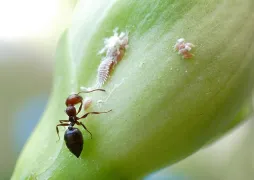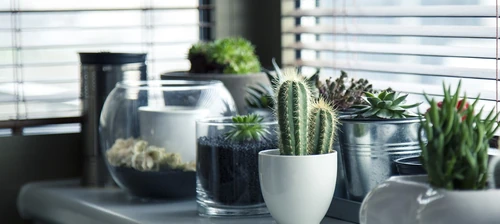Anoectochilus chapaensis, an orchid with foliage worthy of fine jewelry
Anaectochilus chapaensis is a rare plant native to the forests of China and Vietnam. It belongs to the orchid family. But unlike its relatives, it doesn't just shine with its flowers. The colors and patterns of its foliage have earned it the name of jewel orchid.
How to recognize Anoectochilus chapaensis, the jewel orchid?
Anoectochilus chapaensis is a terrestrial orchid measuring 30 cm in height and 30 cm in spread. Its small size makes it a sought-after specimen for terrarium enthusiasts.
While phalaenopsis hybrid are admired for their flowers, Anoectochilus chapaensis captivates the eye for its foliage. The heart-shaped leaves grow in rosettes. Each leaf measures between three and five centimetres and has a velvety texture. The young blades are shaded from burgundy to dark green, with yellow veins. Over time, the foliage turns brown, almost black, and the veins take on a golden hue.
To top it all off, Anoectochilus chapaensis blooms in winter and spring. The jewel orchid is then adorned with bright yellow flowers. Spikes emerge from the center of the rosette, revealing the flower buds.
The inflorescence then gives way to the fruit, a hairy capsule containing a multitude of seeds.
The jewel orchid Anoectochilus chapaensis is harmless to animals and humans. But you may want to keep its precious foliage out of reach of inquisitive children and greedy cats and dogs.
Our maintenance tips
Unlike Phalaenopsis, anoectochilus chapaensis are terrestrial varieties. They need a draining substrate and regular watering. But be careful not to drown their roots!
Watering
If you're worried about drowning the root system, water your Anoectochilus chapaensis from below.
Get a container larger and wider than your Anoectochilus chapaensis pot. Pour in room-temperature, non-calcareous water, such as recycled rainwater.
Place your plant and its pot in the water-filled container, with the liquid halfway up. Wait at least fifteen minutes. Once all the potting soil has been soaked, return your Anoectochilus chapaensis to its place.
Spray
Mist the foliage with non-calcareous water at room temperature. This will increase humidity and limit pest attacks.
Repotting
In spring, transfer your Anoectochilus chapaensis to a larger pot, so that it can continue to grow.
Anoectochilus chapaensis are rhizomatous plants. They develop their root system on the surface and lengthwise.
Your Anoectochilus chapaensis will thrive best in a pierced, cup-shaped pot, wider than it is tall. If possible, choose a transparent model to check the condition and development of the roots. Once the rhizomes have colonized the container, it's time to repot.
Cover your pot with a layer of substrate. You can use potting soil for green plants with a little perlite, or create your own mixture. In this case, opt for a combination of peat moss and perlite or sphagnum moss, pine bark and leaf compost.
Place your Anoectochilus chapaensis in the center and fill with substrate.
Fertilization
You can stimulate the development of your plant during its growth phase, in spring and summer, with fertilizer.
Adding orchid fertilizer to watering water stimulates growth and flowering.
Prune
After flowering, cut off the spent flowers. You can do this by hand, or use a clean, sharp tool such as a pair of scissors or pruning shears.
Cutting
Cutting is carried out during the strong growth phase, generally in spring and early summer.
Take a ten-centimeter stem with at least one leaf and one node. Cut below the node using a clean, sharp tool (scissors, pruning shears, etc.).
Plant your graft in a container adapted to its size. To encourage root growth, we recommend a saucer-shaped pot with holes, wider than it is tall.
Fill the pot with potting soil for green plants, mixed with perlite. You can replace the potting soil with peat moss, or use a mixture of leaf compost, sphagnum moss and pine bark.
Place your seedling in the center and top with the substrate.
Place your seedling in the center and top with the substrate.
Disease / Threat
Information
| Family | Orchids - Orchidaceae |
| Type | Jewel orchid - Anoectochilus |
| Species | Anoectochilus chapaensis - Anoectochilus chapaensis |
| Lifecycle | Perennial |
| Foliage | Evergreen |
| Exposure | |
| Substrat | |
| Planting method |
In pots |
| Categories | |
| Tag |
Flowery |
| Origin |
Southeast Asia |
| Hardiness (USDA) | 11b |
| Leaf color |
|
| Flower color |
|
Discover plants from the same family
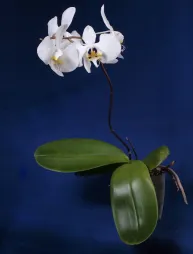
Moon Orchid
Discover
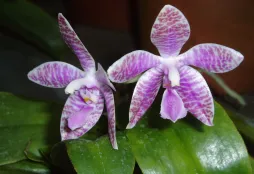
Phalaenopsis lueddemanniana
Discover
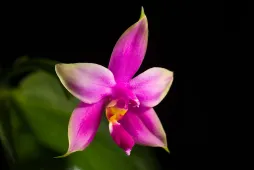
Phalaenopsis violacea
Discover
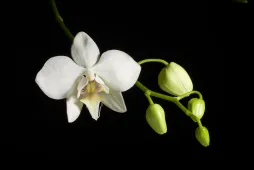
Phalaenopsis Aphrodite
Discover











